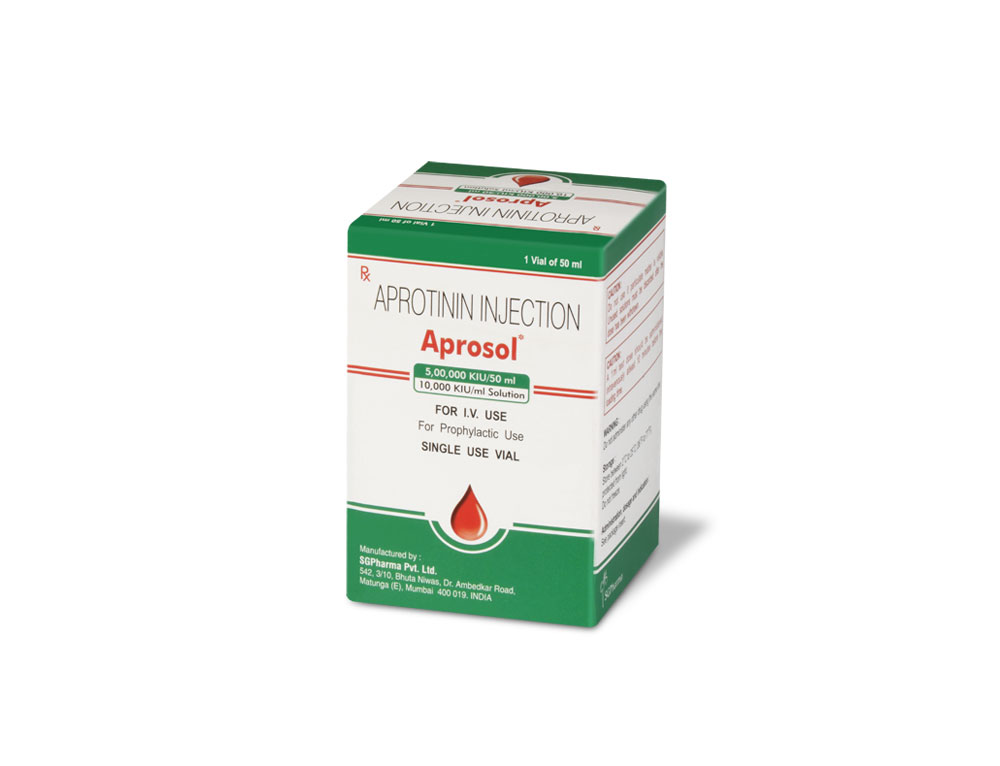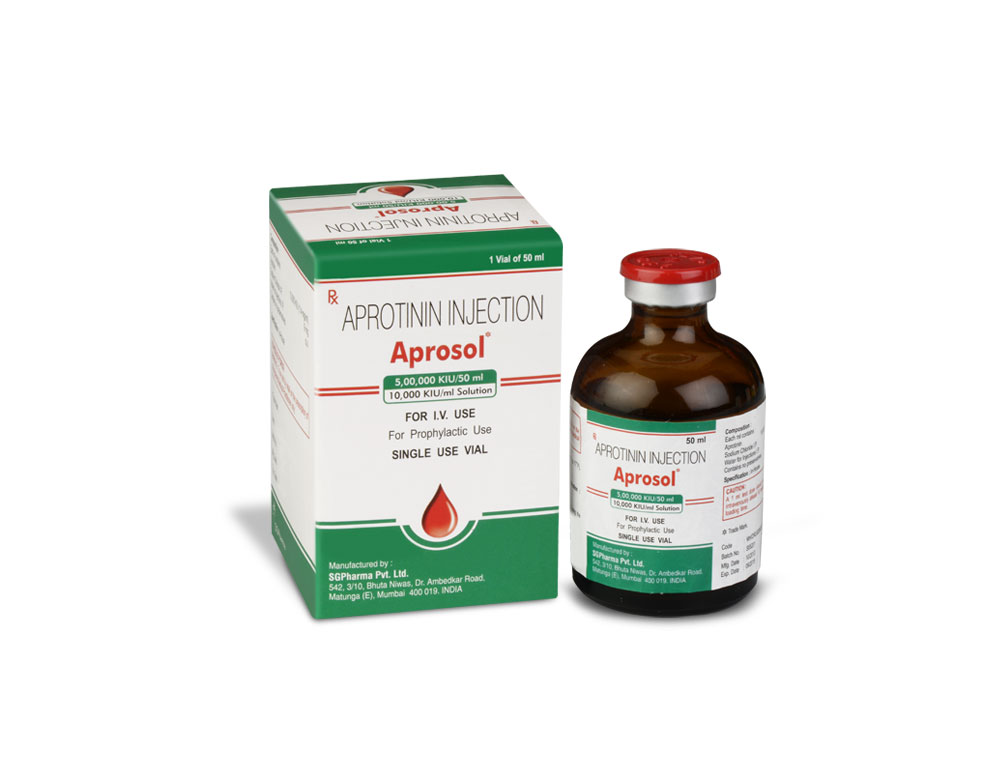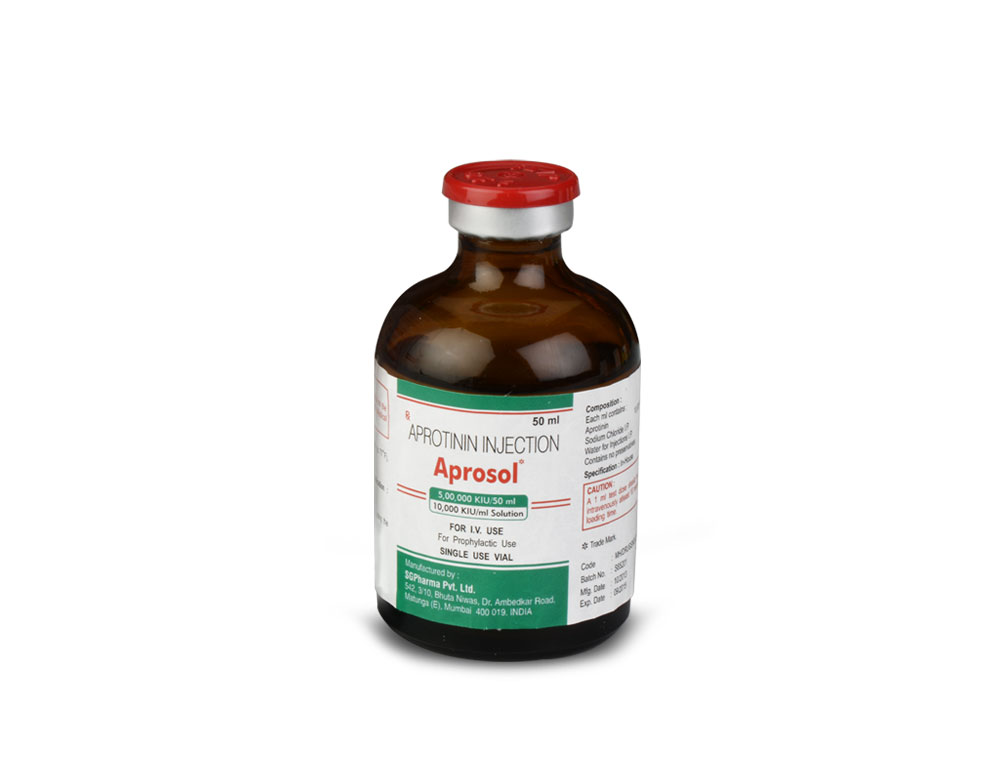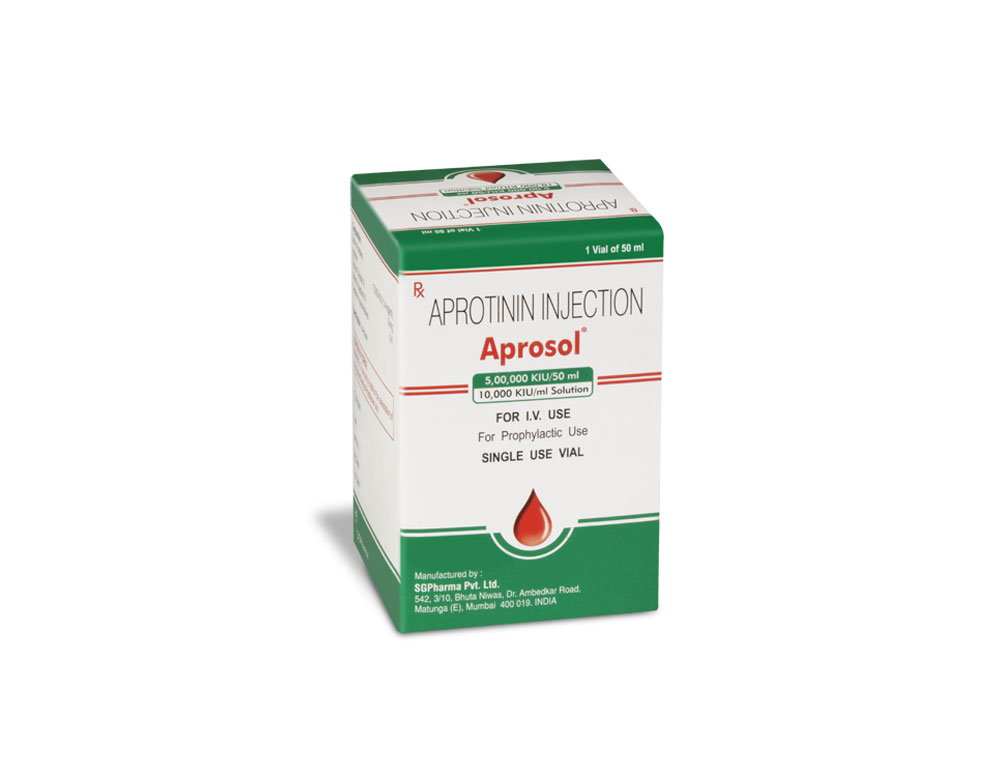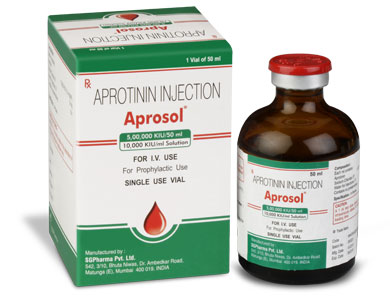
100,000 KIU/10 ml
500,000 KIU/50 ml
For the use of a Registered Medical Practitioner or a Hospital or a Institution only.
APROSOL (Aprotinin) is a highly purified natural proteinase inhibitor obtained from bovine lungs. It is made up of 58 amino acid residues that are arranged in a single polypeptide chain, cross-linked by three disulfide bridges. Chemically, Aprotinin is a polypeptide consisting of a chain of 58 amino acids. Its molecular formula is C284H432N84O79S7 and molecular weight is 6512 Daltons.
-structure.jpg)
APROSOL is a clear, colourless, sterile isotonic solution for intravenous administration.
COMPOSITION :
Each ml contains :
Aprotinin B.P. 10,000 KIU (1.4 mg/ml)
Sodium Chloride I.P. 9 mg
Water for Injections I.P. q.s.
Absorption, Distribution and Bioavailability :
After intravenous injection, rapid distribution of aprotinin occurs into the total extra-cellular space, leading to an initial decrease in plasma aprotinin concentration with a half-life of 0.3-0.7 hours. At later time points, (i.e. beyond 5 hours post dose) there is a terminal elimination phase with a half-life of about 5-10 hours. Average steady-state intra-operative plasma concentrations were 250 Kallikrein Inhibitor Units per ml (KIU/ml) in cardiac surgery patients receiving a dosage regimen of 2 million KIU as an intravenous loading dose, 2 million KIU added to the pump prime fluid, and 500,000 KIU per hour as a continuous intravenous infusion during the procedure. Average steady-state intra-operative plasma concentrations were 137 KIU/ml after administration of half of the above regimen.
Aprotinin accumulates in the kidneys and to a lesser degree in cartilaginous tissue. Accumulation in the kidneys is due to binding to the brush border of the epithelial cells of the proximal tubules and to accumulation in the phagolysosomes of these cells. Accumulation in the cartilaginous tissue results from the affinity of the basic aprotinin to the acid proteoglycans. Concentrations in other organs are similar to the concentrations in the serum. The lowest concentration occurs in the brain; practically no aprotinin passes into the cerebrospinal fluid. Only very limited amounts of aprotinin penetrate the placental barrier. The placenta is probably not absolutely impermeable to aprotinin, but permeation appears to be very slow.
Administration :
All intravenous doses of APROSOL should be administered through a central venous line. Do not administer any other drug using the same line.
Standard emergency treatments for anaphylactic and allergic reactions should be readily available whenever APROSOL is administered. An H1-antagonist and an H2-antagonist maybe administered 15 minutes prior to the test dose of APROSOL. Any administration of APROSOL to patients who have received aprotinin in the past requires a careful risk/benefit assessment because an allergic reaction may occur. A 1 ml (10,000 KIU) test dose of APROSOL should be administered to all patients with an observation time of at least 10 minutes before the main dose of APROSOL.
Even after the uneventful administration of the initial 1 ml test dose, the therapeutic dose may cause an anaphylactic reaction. If an allergic/anaphylactic reaction occurs during the injection, administration should be stopped immediately and the appropriate therapeutic measures instituted, e.g. adrenaline, antihistamines and intravenous corticosteroids. Intravenous fluids, bronchodilators and respiratory support may also be needed. APROSOL should not be used throughout pregnancy unless clearly necessary and only after a careful risk/benefit evaluation. The addition of APROSOL to heparinised blood will prolong the activated clotting time (ACT). Thus, the ACT should not be taken as a reliable indicator of the need to administer additional heparin during a prolonged period of cardiopulmonary bypass. Furthermore, a prolonged ACT in the presence of APROSOL does not necessarily signify excess heparin requiring additional protamine. It is therefore not necessary to adjust the usual heparin/protamine regimen during treatment with APROSOL. An increase in renal failure and mortality compared to age-matched historical controls has been reported for aprotinin-treated patients undergoing cardiopulmonary bypass with deep hypothermic circulatory arrest during operation on the thoracic aorta. APROSOL should therefore be used with extreme caution under these circumstances. Results from recent observational studies indicate that renal dysfunction could be triggered by aprotinin, particularly in patients with pre-existing renal dysfunction. An analysis of all pooled placebo-controlled studies in patients undergoing coronary artery bypass graft (CABG) has found elevations of serum creatinine values >0.5 mg/dl above baseline in patients with aprotinin therapy. Careful consideration of the balance of risks and benefits is therefore advised before administering aprotinin to patients with pre-existing impaired renal function or those with risk factors (such as concomitant treatment with aminoglycosides). Adequate anti-coagulation with heparin must be assured (see also additional note below). Additional note on use with extracorporeal circulation In patients undergoing cardiopulmonary bypass with APROSOL therapy, one of the following methods is recommended to maintain adequate anticoagulation :
2. Fixed Heparin Dosing - A standard loading dose of heparin, administered prior to cannulation of the heart, plus the quantity of heparin added to the prime volume of the cardiopulmonary bypass circuit, should total at least 350 IU/kg. Additional heparin should be administered in a fixed-dose regimen based on patient weight and duration of cardiopulmonary bypass.
3. Determination of Heparin Levels - Protamine titration, a method that is not affected by aprotinin, can be used to measure heparin levels. A heparin dose response, assessed by protamine titration, should be performed prior to administration of aprotinin to determine the heparin loading dose. Additional heparin should be administered on the basis of heparin levels measured by protamine titration. Heparin levels during bypass should not be allowed to drop below 2.7 U/ml (2.0 mg/kg) or below the level indicated by heparin dose-response testing performed prior to administration of aprotinin.
Pregnancy :
Symptoms of overdosage or intoxication are not known. There is no specific antidote.

 Cardiovascular
Cardiovascular



